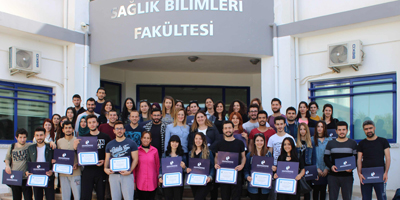Workshop on “Physiotherapy Practices on Risky Infants” held at EUL

European University of Lefke (EUL) Faculty of Health Sciences Department of Physiotherapy and Rehabilitation organized a workshop titled ““Physiotherapy Practices on Risky Infants”.
Academician of Marmara University Faculty of Health Sciences Department of Physiotherapy and Rehabilitation Assoc. Prof. Dr. Gönül Acar attended to the two-day workshop which took place at EUL Faculty of Health Sciences Department of Physiotherapy and Rehabilitation Treatment Exercises Laboratory as a trainer. Graduated physiotherapists and 4th year students of Physiotherapy and Rehabilitation Department participated in the workshop, which was conducted with examples and active practices given by the trainer.
“Natural Infant Development” and “Infant Development Anomaly and Evaluation Methods” on the first day, “Cerebral Palsy and Symptoms and Analysis of Types”, and “Handling Risky Infants (holding and carrying principles) were embraces on the second day of the workshop.
Acar: Infants who have the risk of showing dysfunction in brain development are the risky ones.
Starting with the definition of a risky infant concept for presentation, Acar has stated that the term is used to describe infants who are likely to develop brain dysfunction due to a problem affecting the brain and nervous system during pregnancy, birth, or neonatal period. Acar pointed that regardless of delivery methods as premature or full-term, infants who have been treated in the neonatal intensive care unit, constitutes the largest group of neurologically risky infants. Acar said that “Physiotherapy and education approaches applied to risky infants are called ‘early intervention approaches”. Acar listed the aims of early physiotherapy approaches as; to reduce future deficiencies, to reduce the need for special education and other fields, to ensure that the baby is at the highest level of independence, to reduce the cost given to the institutions, to reduce dependence by supporting children’s ability to meet their needs.
Acar: Practices conducted on infants requires a knowledge of special techniques
Acar said that “The increase in the number of children with premature and low birth weight due to the number of infants born in recent years, improved technology and clinical practice has made it necessary for the child physiotherapists to deepen and diversify their work and cooperate with different specialists,”. Pointing out that the practices conducted on infants requires a knowledge of special techniques and high level of skill, Acar said that for this reason, physiotherapists should be specialized and have to take different courses to work with infants. Acar said that these practices, conducted with a good co-operation with the family, also includes practices carried out during holding, carrying and play time of the infant.
Acar said that “My long years of experiences suggests that these babies must be monitored from birth to at least 2 years of age and ideally until adulthood,”. Acar pointed out that, therefore Pediatric neurologists should collaborate with neonatologists in order to receive early physiotherapy for infants who are at risk of disability in the future and they should try arrange infant’s early physiotherapy protocols in our country, and they should make the necessary legal arrangements for the possession of specialized physiotherapists in neonatal intensive care units.
Acar said that, “In the work shop that was carried out together with the students who will graduate from the European University of Lefke, we have made a detailed study of; how the natural and normal development of a baby changes according to their month, the first signs of Cerebral Palsy and developmental disorders, the holding and handling techniques applied to infants and the treatment principles of Cerebral Palsy according to different types and we also had the opportunity of training and discussion,”.
At the end of the two-day workshop certificate was given to the students who have participated.
